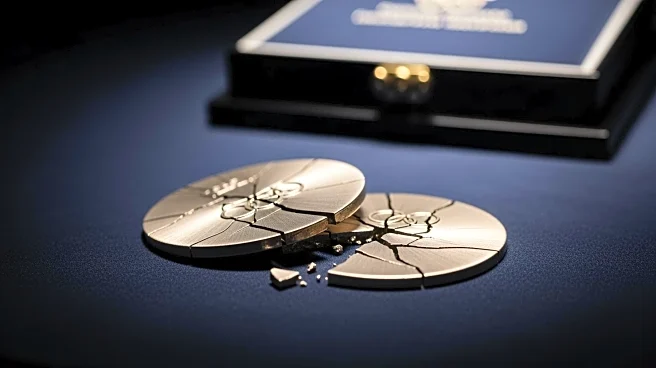What's Happening?
President Trump welcomed Syrian President Ahmad al-Sharaa to the White House, marking a historic moment as al-Sharaa becomes the first Syrian leader to visit the U.S. since the overthrow of Bashar al-Assad. Al-Sharaa, formerly known as Abu Mohammad al-Jolani,
has transitioned from a jihadist leader to a head of state, aiming to unify Syria amidst internal divisions and external pressures. During his visit, al-Sharaa is expected to commit to joining the U.S.-led coalition against ISIS, a significant step in Syria's engagement with Western powers. The U.S. recently removed al-Sharaa from the Specially Designated Global Terrorist list, reflecting a shift in diplomatic relations.
Why It's Important?
This meeting signifies a potential turning point in U.S.-Syria relations, with implications for regional stability and counterterrorism efforts. Al-Sharaa's commitment to the coalition against ISIS could bolster international efforts to combat terrorism. The easing of sanctions on Syria, including the potential removal from the U.S. list of state sponsors of terrorism, may facilitate economic recovery and political stabilization in Syria. However, al-Sharaa faces challenges in unifying Syria, dealing with a resurgent ISIS, and managing fraught relations with Israel and Russia. The meeting also highlights the broader geopolitical dynamics involving Iran and Hezbollah's influence in Syria.
What's Next?
Al-Sharaa aims to leverage his visit to strengthen his domestic position and further ease international sanctions. Discussions with President Trump may address Syria's role in the Abraham Accords and potential normalization with Israel, although Syria's historical stance against Israel complicates this prospect. The focus will also be on countering ISIS and addressing regional security concerns. The outcome of these talks could influence Syria's future diplomatic and economic trajectory, impacting regional alliances and power balances.
Beyond the Headlines
The meeting underscores the complex ethical and geopolitical considerations in U.S. foreign policy, balancing counterterrorism objectives with human rights and regional stability. Al-Sharaa's transformation from a jihadist to a recognized leader raises questions about the rehabilitation of former extremists and the role of international diplomacy in conflict resolution. The evolving U.S.-Syria relationship may set precedents for engaging with other nations undergoing similar transitions.















